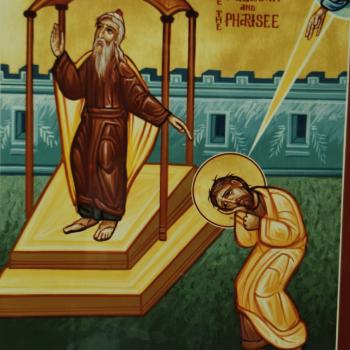In the Torah, dozens of misdeeds are considered capital offenses. However, the Shelach portion contains the only account within the text of the Torah itself of a person executed by stoning. Here, the violator is condemned by God's own word for gathering wood on Shabbat. The name of the wood-gatherer is unknown. In the interpretive tradition, he is simply known as the Gatherer or the Mekosheish. The Gatherer's story begins when fellow Jews bring him to the authorities.
The Children of Israel were in the Wilderness and they found a man gathering wood on the Shabbat day. Those found him gathering wood brought him to Moses and Aaron, and the entire assembly. They placed in him custody, for it has not been clarified what should be done with him.
God said to Moses: "The man shall be put to death; the entire assembly pelted him with stones outside the camp.
The entire assembly removed him to the outside of the camp; they pelted him with stones and he died, as God had commanded Moses. (Numbers 15:32-38)
The Gatherer is condemned to die by the word of God and executed by the hand of his brothers, without the most basic procedural justice. The punishment for his offense is only clarified after the crime occurs, implying that he did not have a full warning that his actions were a capital crime. Furthermore, there is no trial, and thus the Gatherer's intent remains unknown. The laws of Shabbat observance, as developed by the Talmud, are dependent on the intent of the violator. An action may be permitted, even if a side effect is definitely prohibited; this concept is known as "pesik reisha." (Rabbis later prohibited pesik reisha through rabbinic decree.) Without knowing the Gatherer's intent, his guilt cannot be established by a human judge. God usurps the law.
Uncomfortable with the absence of procedural justice, the interpretative tradition moves to write it into the story. The scope of what was not known about how to proceed with the Gatherer is reduced to the detail of stoning. According to a common interpretation, the Gatherer knew he would be killed but he did not know that he would be killed by stoning (Targum Jonathan Numbers 15:32). The Talmud goes further and assumes that the Gatherer was warned according to the normative law of capital crimes, where in order to be executed the offender needs to be warned right before he commits the offense, acknowledge that he understands the offense and its punishment, and, within moments of the warning, commit the offense (Sanharin 41a).
We are also filled in on the intent of the Gatherer, which can be best described as "suicide by cop" (Rabbi Wall of the Sixth Street Synagogue, in New York City). The Talmud cites earlier traditions that ascribe to the Gatherer the intention to educate the Israelites as to the importance of observing Shabbat and other commandments. He wanted to teach the people, through his tragic sacrifice, that even after the sin of the spies and the punishment of wandering in the desert for forty years (which immediately proceeds the Gatherer), God still cares about the nation's observance of the law (Bava Batra 119a).
The harshness of the punishment is perceived to be diminished when procedural justice is written into the story. The Gatherer's death was not unjust because it was known that gathering wood on Shabbat was a capital crime, he was warned, and better yet, the Gatherer choose suicide by God.
This interpretive gloss moves us away from the text. We are no longer imagining an unsuspecting man dragged to Moses by an angry mob, only too happy to punish their brother by a yet-to-be-declared punishment. When the tradition finds itself facing a savage God, the tradition transforms the narrative of crime and execution into one of inexplicable faith.
The attempted sacrifice of Isaac by his father's (Abraham's) hands receives the same treatment. Isaac wanted to die, we tell ourselves. The Gatherer becomes yet another voluntary human sacrifice—the bearer of the faith that we do not have. The Gatherer saves us from our God.
6/14/2011 4:00:00 AM





